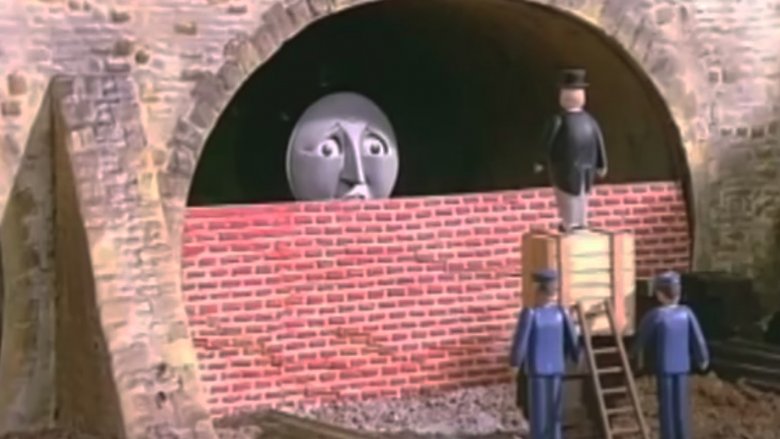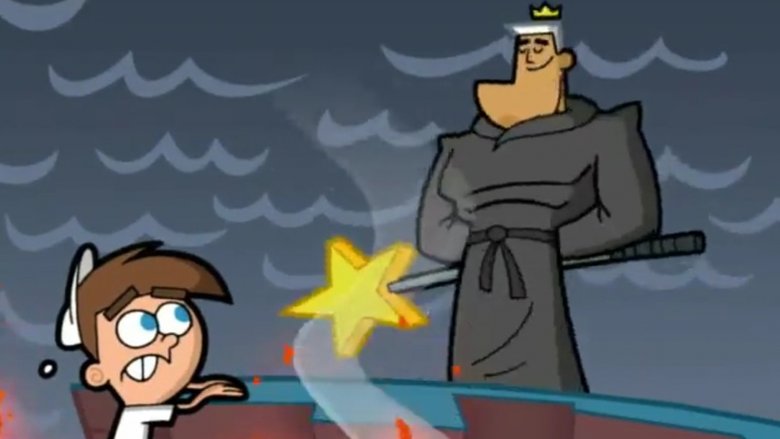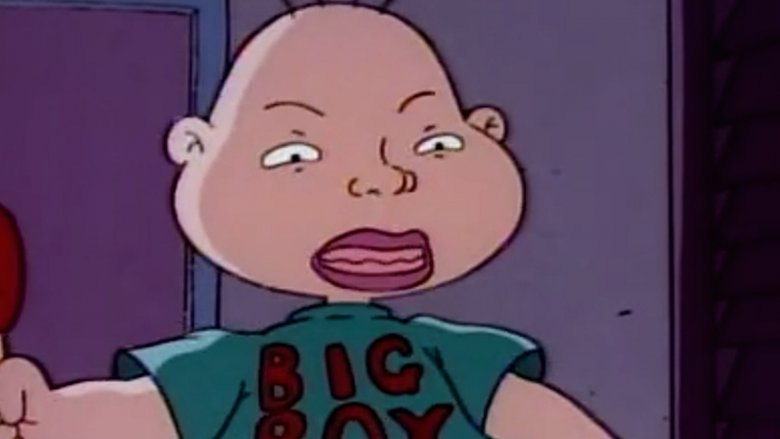The Darkest Episodes Of Kids' TV Shows
They're often billed as "family-friendly," "wholesome," or "appropriate for children," but sometimes, television shows designed for young audiences contain some really dark and twisted stuff. With plots involving traumatizing topics like rape, suicide, parental abandonment, and murder, it's frankly amazing that some of these episodes ever made it on the air—and that parents didn't notice or take offense at the questionable content. There are many examples of dark episodes of "family" TV out there, but here are some of the worst offenders.
The Fresh Prince of Bel-Air (Papa's Got a Brand New Excuse)
While The Fresh Prince of Bel-Air occasionally touched on serious topics, perhaps no moment of the series was more darkly poignant than the final scene of the fourth-season episode "Papa's Got a Brand New Excuse." In this episode, Will's absentee father Lou comes back into his life after 14 years. Initially, Will is happy about Lou's sudden return—forgiving his father and excitedly making plans to go on a trip with him over the summer. He even buys a very special present for his dad: a statue of a father cradling a young child. While Will has welcomed his father back with open arms, Uncle Phil and Aunt Vivian are more dubious about Lou's motivations—and for good reason.
Ultimately, something else "comes up" for Lou, and he tells Will that they can't go on the trip after all. At first, Will takes it stoically as his dad walks out on him again, but then he launches into an emotional breakdown once he and Uncle Phil are alone. Will Smith really showed his acting chops in the completely improvised scene, progressing from denial to anger to grief, then finally collapsing in Uncle Phil's arms and sobbing, "How come he don't want me, man?"
His performance even spawned a false rumor that Smith's real-life father hadn't been there for him, either. The moment was so touching and convincing that you can hear the live audience (and cast members watching from the wings) choking back their own tears so they wouldn't ruin the take.
The Fairly Odd Parents (It's a Wishful Life)
From the opening moments of the season five episode "It's a Wishful Life" on the quirky animated series The Fairly OddParents, things go downhill fast. Main character Timmy keeps trying to do good deeds, but nobody appreciates his efforts, and even his loved ones complain or criticize him afterwards. Understandably upset, Timmy wishes that he'd never been born—a wish that his fairy godparent Wanda reluctantly grants.
In a parody of the classic Christmas film It's a Wonderful Life, Timmy sees what the world would be like without him. However, unlike the movie (where the main character sees the positive impact he's made in people's lives), Timmy's fairy guide reveals that everyone he knows is much happier in a world where he doesn't exist. That's some pretty twisted stuff for a Nickelodeon cartoon aimed at grade-schoolers.
Even more troubling, Timmy is later shown the Hell-like place where all the kids who wished they were never born go—implying that this sort of thing happens on a fairly regular basis. Later, the fairy explains that the whole thing was a setup, aimed at teaching him the lesson that a job well done is its own reward—a lesson that probably could have been imparted in a much less traumatizing manner. Considering that It's a Wonderful Life is about a guardian angel preventing the main character's suicide, and this episode parodies the movie by flipping its plot, that's a pretty disturbing message if you're a kid—especially if you are going through a tough time in your life.
Boy Meets World (Cult Fiction)
Like The Fresh Prince of Bel-Air, ABC's coming-of-age sitcom Boy Meets World didn't shy away from difficult subjects, like domestic violence and alcoholism. Several of these episodes (frequently centered on Cory's best friend Shawn Hunter) would be good candidates for this list, but one tops them all: the season four episode "Cult Fiction." Shawn's home life is a turbulent one, with absentee parents who walked out on him more than once and Shawn still frequently struggles with loneliness and abandonment issues. This makes him a perfect mark for a local cult that targets troubled kids and he dives in head-first—soon becoming hopelessly brainwashed by the cult's leader, Mr. Mack.
Later, Shawn's teacher Mr. Turner, who has at times served as a sort of surrogate father to him, is involved in a bad motorcycle wreck and is hospitalized. Unable to cope with the situation, Shawn brings Mr. Mack to the hospital with him, where Cory's father and Principal Feeny have a confrontation with the cult leader and make him leave. Meanwhile, Cory and Topanga bring Shawn to Mr. Turner's room and force him to confront the reality of their teacher's condition head-on.
In a touching scene, Shawn pleads with Turner to not leave him alone. He then directs his emotional monologue at God, saying, "I've never asked you for anything and I never wanted to come to you like this. But don't take Turner away from me. He's not done yelling at me yet. God, you're not talking, but I know you're here. So, I'm going to talk and you can listen. God, I don't want to be empty inside anymore."
Rugrats (Angelica's Worst Nightmare)
If you grew up watching the Nickelodeon cartoon Rugrats, you might not have been aware of the heavy themes going on behind-the-scenes. If you rewatch the series as an adult, you soon notice some really tragic backstories—which aren't really noticed or understood by the babies. Rugrats even has its own creepy It's a Wonderful Life spoof which would be worthy of a spot on this list—if it weren't for the much darker episode, "Angelica's Worst Nightmare."
Spoiled toddler Angelica Pickles enjoys her status as an only child, so when her mother announces that she is pregnant, Angelica's fragile ego is thrown into a tailspin. Her parents ignore her while discussing the pregnancy, and Angelica begins to worry that they won't have time for her—so she asks her mother not to have the baby. Her mother laughs this off, and a troubled Angelica goes to bed upset and frustrated. In a nightmare, Angelica's baby brother has arrived, and her parents have forgotten who she is. She's sent to live in the laundry room and eat table scraps while her brother is given her room and all of her toys.
Not satisfied with just taking everything she loves, the now-gigantic baby chases Angelica out of the house, and down the road as she tries to drive away in the family car. He catches her, picking up the car and starting to eat it—which causes her to wake up, screaming. Later, Angelica's parents tell her that they aren't going to have a baby after all (presumably because of a false-positive or a miscarriage). While she feigns disappointment, Angelica is secretly pleased about the sad news.
Little House on the Prairie (Sylvia Part 1 & 2)
While it has a reputation as a family-friendly and morally uplifting show, Little House on the Prairie was packed with so many disturbing moments, it could probably fill this list all on its own. But even as disturbing as those other moments were, they pale in comparison to the horrifying and tragic two-part episode, "Sylvia."
When pretty 15-year-old Sylvia moves to Walnut Grove, things go badly for her right away. Some local boys peep through her window, which many townspeople blame her for. Later, she is raped by a mime (yes, really), which her father blames her for—before swearing her to secrecy. Then Sylvia discovers she is pregnant with her rapist's baby, and everyone in town thinks the baby's father is her new sweetheart, Albert. Albert is furious with her at first for cheating, but he forgives her after she confesses to being raped.
When she refuses to move away from town with her father, he calls her a whore and tries to kill Albert. Sylvia and Albert decide to elope, but Albert unwittingly tells her rapist (his boss, Irv Hartwig) where she's hiding out. Hartwig (in his mime mask) attacks Sylvia again in a barn, and she falls from a ladder while trying to escape. Even though Albert, Pa Ingalls, and Sylvia's father arrive to save the day, she dies from her injuries in Albert's arms—while her rapist seemingly survives a shotgun blast. The end. How's that for some wholesome entertainment for the entire family?
SpongeBob SquarePants (Nasty Patty)
While it's probably one of the best early episodes of SpongeBob SquarePants, there was plenty of dark and twisted humor to go around in the season three episode "Nasty Patty." When a health inspector unexpectedly shows up at the Krusty Krab and demands one of everything on the menu, SpongeBob and Mr. Krabs become suspicious when they overhear a news report about a con artist posing as a health inspector to scam free food. In retaliation, they concoct a disgusting "Nasty Patty" for the inspector containing all sorts of vile ingredients. The inspector chokes on a fly and passes out, but SpongeBob and Mr. Krabs panic, believing they've accidentally killed him with the Nasty Patty.
For the rest of the episode, they try to dispose of the "body" in various ways, and when the health inspector starts to wake up as they bury him alive, they accidentally knock him out again (never realizing that he's not really dead). His shallow grave washes away, and they dig him out before being picked up by some unsuspecting police officers, who give them a ride back to the Krusty Krab (with the inspector hidden in the cop car's trunk).
Then SpongeBob sticks the inspector in the freezer, which backfires when one of the officers asks for ice with his drink. Mr. Krabs and SpongeBob confess everything and open the freezer, but the "body" is missing. When the very-much-alive inspector suddenly reappears, the police beat the tar out of him because they think he's a zombie. They soon realize their mistake, the inspector gives Mr. Krabs a passing grade on the restaurant, and everyone eats some Krabby Patties to celebrate.
The Powerpuff Girls (Twisted Sister)
In The Powerpuff Girls episode "Twisted Sister," the eponymous trio of cute cartoon superheroes find themselves overwhelmed with school, chores, and constantly saving the day. They decide to create a fourth Powerpuff Girl to help share the load, but instead of following the Professor's original formula, the girls use artificial sweetener, dirt, and things like crayons, lizards, and boxing gloves—along with the secret ingredient, Chemical X. They succeed in creating a girl, who they name Bunny, but she's gigantic, misshapen, and not very bright. Still, the girls take advantage of her willingness to help by sending her off to fight all the crime in Townsville while they relax.
Unfortunately, Bunny mixes things up—throwing police officers in jail while letting the criminals run free. When her sisters arrive on the chaotic scene, they angrily tell Bunny she's a bad girl and can't be a Powerpuff Girl after all. The heartbroken Bunny flies away to sob her heart out on a lonely cliffside, but she returns when she hears the Powerpuff Girls crying for help as they are surrounded and beaten up by the criminals. Bunny rescues the girls and defeats all the bad guys, excited that she's finally been "good."
Unfortunately, this effort was too much for Bunny's unstable body, and she explodes. A piece of her dress flutters to the ground, and the girls cry as they realize how bad they were and that Bunny is gone forever. To tie a bow on this twisted tale, the tearful narrator tells the audience, "And so, for the first and final time, the day is saved thanks to Powerpuff Bunny."
Dinosaurs (Changing Nature)
The '90s ABC sitcom Dinosaurs (featuring Muppet-like dinosaurs created by Jim Henson Productions) was a fairly upbeat parody of modern American families, but it occasionally included episodes that touched on more serious topical issues—including racism, religion, sexual harassment, and women's rights. When the show's run came to an end after three seasons, the writers tied up the loose ends in the series finale "Changing Nature," which is a depressing parable about progress and climate change.
When Earl Sinclair's employers at the WESAYSO company destroy a swamp to build a factory, they kill off an entire species of insects—a species which helps keep an invasive type of poppies at bay. The plants run wild, and the bumbling Earl gets duped by his boss into leading a task force to deal with the poppies. He decides to poison the plants, and WESAYSO helicopters spray herbicide all over the world—which not only kills the poppies, but all other plant life. In a even stupider gambit to make it rain so the plants will return, the company drops bombs into volcanoes so the smoke will make bigger clouds. Instead, the thick ash blocks out the sun, sending the planet into an ice age—which spells certain extinction for the dinosaurs.
The series closes out with Earl apologizing to his family for causing the end of the world, as they huddle together in their home while snow falls all around them.
Tom & Jerry (Blue Cat Blues)
In stark contrast to the silly antics typically found in episodes of the classic cartoon Tom & Jerry, the 1956 feature "Blue Cat Blues" has an extremely tragic (and traumatizing) plot. Tom falls in love with a beautiful white cat, but although she returns his affections at first, she eventually leaves Tom for a rich neighborhood cat named Butch. Jerry tells Tom to move on with his life, but Tom can't let go of his love and desperately attempts to win her back. He showers her with expensive gifts, but Butch always one-ups him with an even more impressive display of wealth. In a last-ditch effort, Tom literally sells himself into slavery to buy her a car—which promptly gets destroyed by Butch's fancy coupe.
Heartbroken and hopelessly in debt, Tom turns to the bottle—the milk bottle, that is. He drowns his sorrows, and Jerry despairs of how to save his friend. When Tom sees his former girlfriend and Butch drive by with a "Just Married" sign on the back of their car, he gives up on life and sits down in the middle of some train tracks.
Jerry consoles himself that at least his girlfriend wouldn't do that to him. Just then, Jerry sees his own girlfriend drive by with a different mouse, and a "Just Married" sign hangs from the back of their car, too. Realizing that life now holds nothing for him either, Jerry joins Tom on the track, and the screen fades to black as the sound of a train whistle approaches.
Thomas the Tank Engine (The Sad Story of Henry)
Most episodes of the popular children's series Thomas the Tank Engine are rather cheerful affairs, usually with Thomas or one of the other engines learning a valuable lesson after being stubborn or childish in some way. In one early episode, "The Sad Story of Henry/Come Out Henry," a similar setup unfolds, but things take a decidedly dark turn.
The green engine Henry is afraid the rain will ruin his bright and shiny paint, so he takes refuge inside a tunnel, and then refuses to leave it—even after the rain stops. When logical reasoning, firm orders, and even brute force fail to budge the silly steam engine, railway manager/father figure Sir Topham Hatt finally gives up, telling Henry that he can have it his way.
Henry's driver and fireman abandon him, then workers pull up the rails to the tunnel and lay bricks over the entrance, trapping Henry inside. The other engines cheekily whistle at Henry as they pass, and he becomes extremely lonely and miserable. Henry's fire goes out, so he can no longer whistle back at his friends, and the soot from their smoke ruins his shiny paint. As the sad green engine contemplates his unknown fate, the plucky narrator (Ringo Starr) asks the child audience, "But I think he deserved his punishment, don't you?" That's right, kids: if you misbehave, then it's completely normal for your parents to lock you in your room and not let you out. And if you've been really naughty, they might never come back.


